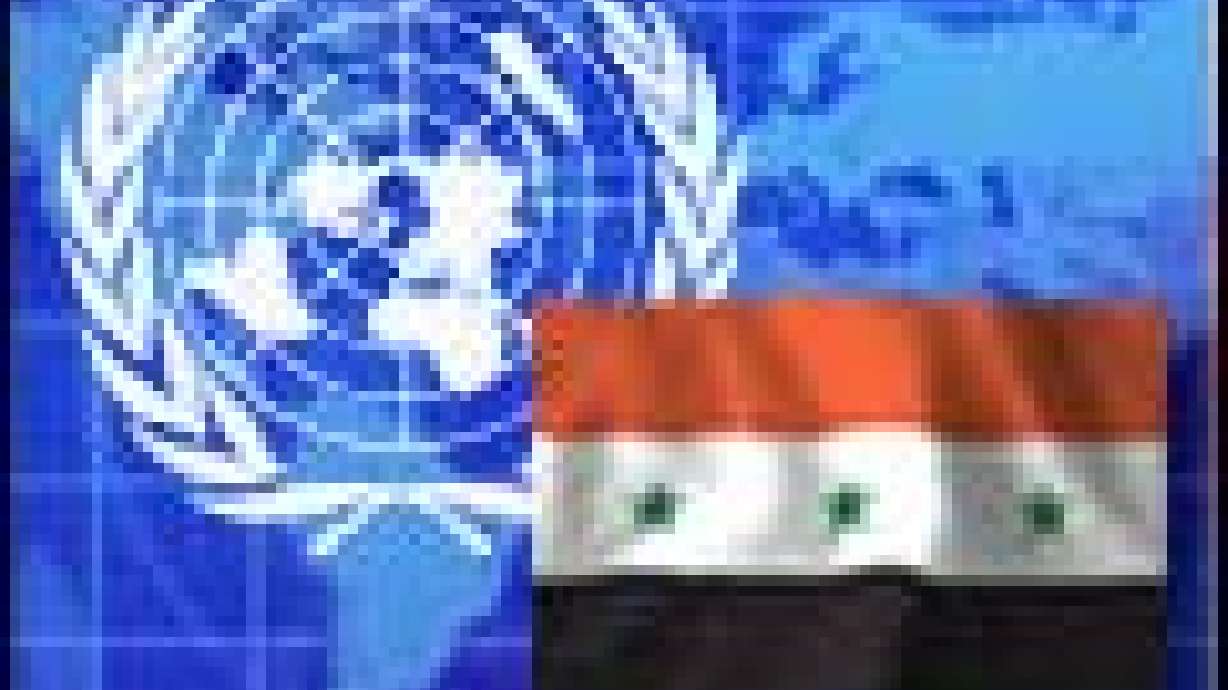Estimated read time: 4-5 minutes
This archived news story is available only for your personal, non-commercial use. Information in the story may be outdated or superseded by additional information. Reading or replaying the story in its archived form does not constitute a republication of the story.
BAGHDAD, Iraq (AP) -- The chief U.N. nuclear inspector on Thursday demanded Iraq show a "drastic change" in its cooperation with the hunt for banned weapons of mass destruction a day after the United States said Baghdad was trying to foil the search.
Inspectors in Iraq, meanwhile, continued the scouring the country as their chiefs, Mohamed ElBaradei and Hans Blix, prepared to press Iraqi officials for greater cooperation.
Blix and ElBaradei also were to challenge Iraqi officials to respond to issues raised by Secretary of State Colin Powell at the Security Council Wednesday, said Hiro Ueki, their spokesman. The inspection chiefs hold talks in Baghdad this weekend.
Powell presented a carefully prepared case before the council Wednesday that Iraq was defying demands it disarm and detailed alleged ways Baghdad was eluding inspectors. Iraq dismissed Powell's presentation as a collection of "stunts" and "special effects" designed to create a pretext for war.
"Iraq is not cooperating fully, they need to show drastic change in terms of cooperation," ElBaradei said in London after he and Blix met British Prime Minister Tony Blair.
Blix and ElBaradei will be in Baghdad in advance of their next report to the Security Council on Feb. 14. Blix told the council Jan. 27 that Iraq has yet to show a "genuine" desire to disarm, an assertion that prompted the Iraqis to pledge more cooperation.
"We need to show progress in our report," ElBaradei said Thursday. "Our mission in Baghdad this weekend is crucial. We hope we will secure full, 100 percent cooperation on the part of Iraq."
Powell told CBS' "60 Minutes II" in an interview that he would be watching the trip closely to see "whether they bring back anything of use for Security Council deliberations" next week.
In his 75-minute televised presentation Wednesday, Powell used satellite pictures, recorded telephone intercepts and defectors' statements to provide what he called "irrefutable and undeniable" evidence that Saddam was hiding weapons of mass destruction.
Powell's presentation was not shown by Iraq's state television, and Thursday's newspapers, which are under tight government control, made no mention of Powell's remarks.
During the 1990s, previous U.N. inspection teams oversaw the destruction of many banned weapons and production programs under U.N. resolutions adopted after Iraq's defeat in the 1991 Gulf War. The new inspections, resumed in November after a four-year gap, are aimed at finding leftover weapons and determining whether the Iraqis resumed their production in the inspectors' absence.
After more than 500 inspections, the arms monitors have not produced any major evidence that Iraq has such weapons or maintains the capability to produce them.
Thursday's inspections included a a military engineering academy, a brewery and an army complex that includes a missile site west of Baghdad. They also paid surprise visits to the water and sewage authority and the laboratories of a health care complex in Baghdad. Inspectors returned to a storage facility belonging to Al-Tuwaitha, the center of Iraq's former atomic program south of Baghdad, which they had inspected the day before.
Presidential adviser Lt. Gen. Amir al-Saadi, speaking at a news conference in Baghdad on Wednesday night, suggested that telephone monitored Iraqi conversations played by Powell were fabricated, that defector informants were unreliable, and that the satellite photographs he displayed "proved nothing."
"What we heard today was for the general public and mainly the uninformed, in order to influence their opinion and to commit the aggression on Iraq," al-Saadi said.
"This was a typical American show, complete with stunts and special effects," he said.
Most U.S. allies want more time for U.N. weapons inspectors to do their work. But President Bush has signaled his impatience with the inspections process and pledged to disarm Iraq forcibly if it does not immediately comply with U.N. resolutions -- with or without its allies. The United States already has some 100,000 troops amassed in the Gulf region and the number could rise to 180,000 in a matter of weeks.
Of the 15 Council members, only the United States and Britain have offered unwavering support for forcibly disarming Saddam.
Iraqi Ambassador Mohammed Al-Douri, who took part in Wednesday's Security Council session, said he was satisfied that most of the council -- including France, Germany and Syria -- favored giving inspectors more time to do their work rather than rushing to military action.
"It's obvious that Mr. Powell's remarks did not achieve the results the U.S. administration intended," Al-Douri said.
Al-Saadi, Saddam's science adviser, said the telephone conversations Powell played to the Security Council purporting to show Iraqi officers conspiring to deceive the weapons inspectors, were just fabrications.
"Any third-rate intelligence outfit" could manufacture such tapes, he said. "It's simply untrue and not genuine because we have nothing to hide."
Turning to satellite photographs that Powell described as being a chemical weapons storage facility, al-Saadi said they were old and "proved nothing." Similar photos were checked by U.N. teams who found allegations of suspicious activities to be unfounded, he added.
He also challenged Powell to prove that Baghdad was issuing false death certificates for scientists wanted for private interviews with inspectors, and dismissed his claim that documents on banned weapons' programs were being concealed at the homes of scientists.
(Copyright 2003 by The Associated Press. All Rights Reserved.)








